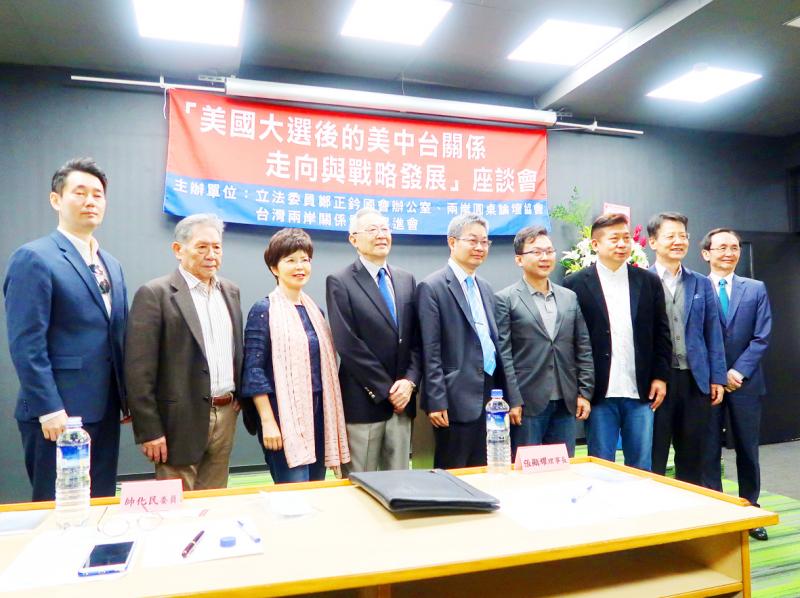By Chen Yu-fu and Jason Pan

China would not attack Taiwan before 2024, as long as President Tsai Ing-wen (蔡英文) does not push for de jure independence or moves to rely on foreign countries for security, an academic said yesterday.
Chao Chun-shan (趙春山), a professor emeritus at the Institute of China Studies at Tamkang University, made the remarks at a forum organized by the Taiwan Cross-Strait Roundtable Forum Association, which is affiliated with the Chinese Nationalist Party (KMT).
“The US would not change its policy for ‘strategic ambiguity’ on Taiwan, while the US and China would continue to have confrontations and cooperation, as in trade matters,” Chao said.
A group of academics take part in a seminar in Taipei yesterday to discuss the relationship between Taiwan, China and the US following this year’s US presidential election.
“The key for Taiwan is to avoid becoming embroiled in US-China conflicts, while striving for inclusion on issues where the two sides cooperate,” he said.
Taiwan was only mentioned briefly in 15 words during Chinese President Xi Jinping’s (習近平) address at the Fifth Plenary Session of the 19th Chinese Communist Party (CCP) Central Committee in Beijing last week, Chao said.
“Xi did not talk about ‘one country, two systems’ nor warn against Taiwan independence,” he added.
“Next year Beijing is to celebrate the 100-year anniversary of the founding of CCP, so it is highly unlikely that China would start a war,” he said, adding that the CCP would hold its 20th National Congress in 2022.
“How can Xi start a war in the Taiwan Strait during this period?” Chao said.
In addition, the CCP’s deadline to complete its military modernization effort is 2027, when it would mark the 100-year anniversary of the Chinese Red Army, the predecessor of the Chinese People’s Liberation Army, he said.
“Therefore, as long as President Tsai does not push for de jure independence, and avoids overreliance on foreign countries for security, then we are certain that China would not attack Taiwan before 2024,” he said.
US President Donald Trump and former US vice president Joe Biden, Trumps contender in Tuesday’s presidential election, agree on deterring China’s rise as a regional power, and confrontations between the nations would continue in the long term, Chao said.
“We would not see much change in this strategy, except in its application,” he added.
“Biden favors multilateralism, while he is against decoupling from China, so Taiwan need its own strategy, and cannot just follow US policy as before,” Chao said.
“No matter which candidate ends up in the White House, the US and China will continue to compete on trade, technology and military capabilities... Taiwan has to carefully and closely observe changes in US-China-Taiwan relations to find the most appropriate approach going forward,” association chairman and former Mainland Affairs Council deputy minister Chang Hsien-yao (張顯耀) said.
No comments:
Post a Comment